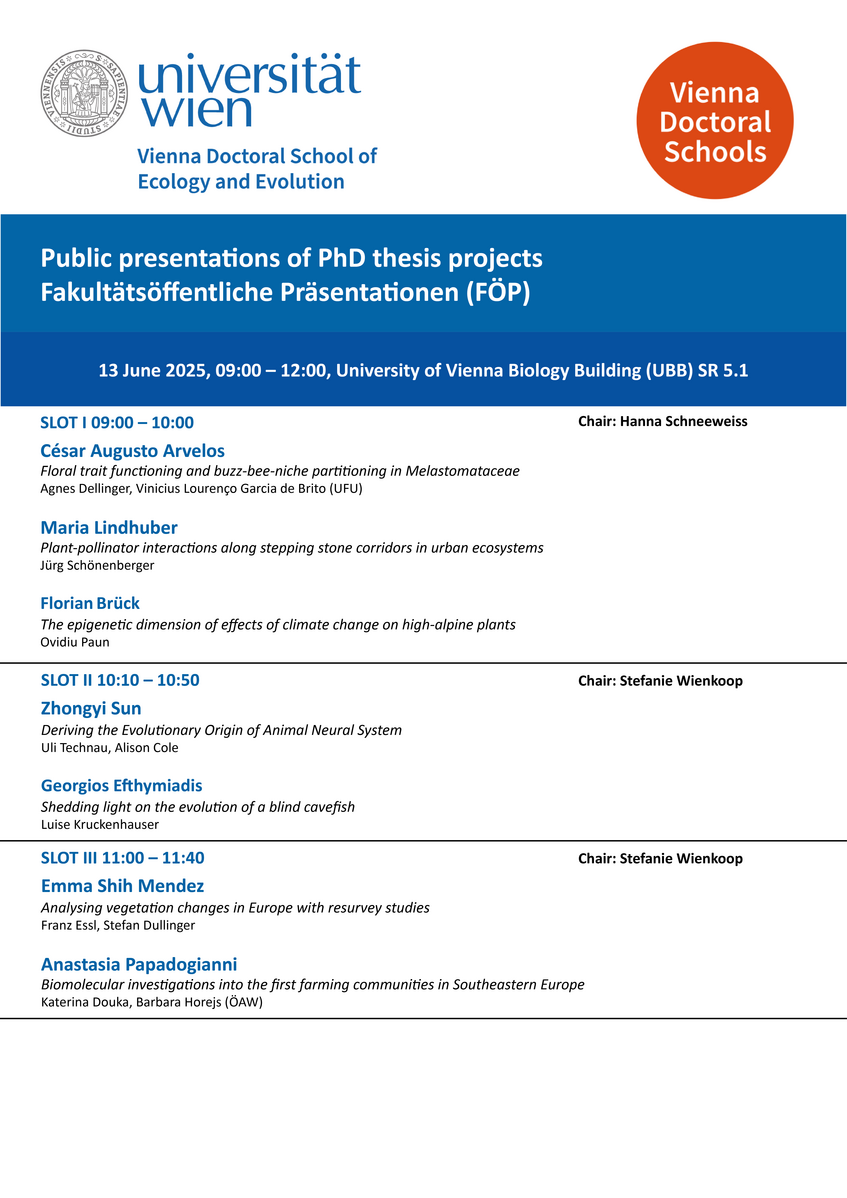Public Presentation of the PhD thesis project
The topic of the doctoral thesis and supervisor(s) have to be approved by the study programme leader of the Vienna Doctoral School of Ecology and Evolution within 3-6 months after starting the PhD.
The approval is based on the submitted research proposal (Exposé) and the public presentation (FÖP). The procedure is the following:
- 6 weeks prior to the FÖP, the registration documents have to be submitted to the Doctoral School
- The exposé is then reviewed by a member of the VDSEE PI-panel
- At the FÖP, the PhD-candidate present their project in front of the Dircetor and Vice-Director of VDSEE, the supervisor(s), and the VDSEE-community.
- Based on the reviews and the public presentation, the PhD-project gets approved by the study programme leader of the VDSEE.
- Should a doctoral topic not be approved by the study programme leader, the doctoral candidate has the option of revoking their application, adapting the research project and reapplying for the approval of their doctoral thesis at the next public presentation.
The public presentation serves the following purposes:
- According to the statutes of the University of Vienna, the public persentation has to be successfully passed for approval of the doctoral thesis project and supervisor(s).
- The new doctoral candidate can present their research to a wider audience.
- The public presentation offers all participants a platform for feedback, exchange and networking.
Dates
- Friday 13 June 2025, SR 5.1 (UBB)
Registration closed - Friday 07 November 2025, SR 3.1 (UBB)
Registration deadline on 29 September 2025
Registration via email: docschool.vdsee@univie.ac.at
June 2025 Schedule

Registration for presenters
In order to register for the public presentation, the following documents need to be submitted to docschool.vdsee@univie.ac.at.
- The research proposal (Exposé) as one pdf-file: Guidelines how to write the exposé are in the section below
- The completed and signed form SL/D11"Registration of the topic of the doctoral thesis and the supervisors" and the signed form SL/W1 "Regulations relating to good scientific practice". A guideline how to fill in the SL/D11 form is provided in the VDSEE intranet.
- Together with your supervisor(s) please complete and submit the expectation worksheet
- If needed, also the forms SL/D12 and SL/W4: in case the PhD-candidate needs additional financial resources and/or applies for a presentation closed to the public. Please note: PhD-candidates with third-party funidng do not need to fill in the additional SL/W4 form.
- Please name your files as follows: SL.D11_surname.pdf, SL.W1_surname.pdf, Expose_surname.pdf
- Please note: The dissertation agreement is completed and handed in after passing the FÖP
Guidelines for Exposé
Please use the template provided in the VDSEE intranet
1) Title Page
- (Working) Title of your Dissertation Project
- Your Name, student number and email address
- Supervisor(s)
- TAC members: two co-mentors beside your supervisor(s)
- Funding
2) Main part: max.10 pages (excl. references)
- Introduction
Short background, outline of the state of research:What is your specific field of research? Where do you start from? - Aims/Main questions/Significance of your planned research:
What do you want to answer with your thesis? Why is this important? Description of the topic of the doctoral thesis project including a clear research questions/aims. - Research methods:
Which methods and experimental setups will be used; which infrastructure/collaboration partners do you need/have at hand - Time and work schedule:
When do you plan to do what and achieve your goals. Please provide a Gantt chart. - Contingency Plan/Risk Analysis:
Where do you see potential problems/risks in your work/research plan? Have you thought of solutions/alternatives? - Funding/Financial stability to conduct PhD studies:
E.g. Salary and further description on funding such as coverage of consumables, etc - TAC Committee:
Choice of supervisor(s) and co-mentor(s), etc.
3) Cited References
Notes on funding
- Funding of the dissertation project must be secured in order to have it approved at the FÖP
- This is important particularly resp. consumables and lab costs. Therefore, estimation of costs and coverage of those costs have to be described in the exposé. This might also be an issue in (third-party) funded projects in case only salary is covered.
- The coverage of costs for consumables has to be approved by your Department Head/Faculty in advance (for registration to presentation this would include the submission of the additional SL/W4 form)
- Self-funded students are welcome, but the aim should be to work on the dissertation as full-time as possible.
Tips
Visit the public presentations! In doing so you can get an impression of what will be expected from you. Additionally, it is a great way to learn about current research projects at your Doctoral School.
The Center for Doctoral Studies regularly offers workshops on "Outline and Exposé writing" to be prepared for the FÖP.
FORMS
ENGLISCH
Mandatory forms
- SL/D11 – Registration of the topic of the doctoral thesis and the supervisors
Note: p.1 Box 'Supervisor' - please enter only supervisor name(s) and not the 2 co-mentors that are part of TAC - SL/W1 – Regulations relating to good scientific practice
Optional forms
- Expectation worksheet
- SL/W4 – Approval of financial support of the doctoral thesis project
- SL/D12 – Registration of the doctoral thesis topic and announcement of the supervisor(s) - supplementary sheet
